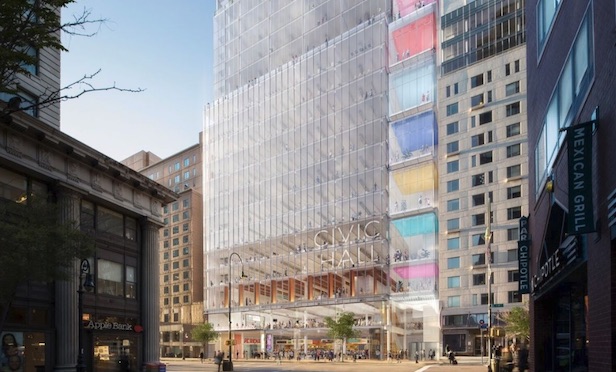 Architectural rendering of 124 E. 14th St. development which will house the tech hub.
Architectural rendering of 124 E. 14th St. development which will house the tech hub.
NEW YORK CITY—On Wednesday, the New York City council unanimously voted to approve rezoning which allows building the 21-story Union Square tech hub. Community members organized by the Greenwich Village Society for Historic Preservation supported the tech hub but only with zoning and landmark protections for the surrounding area.
Councilmember Carlina Rivera, who represents the district that includes 124 E. 14th St., where the tech hub will be built, announced a deal reached with the council and Mayor Bill de Blasio. It required a special permit for new hotels in the area, a commitment to consider certain sites for landmarking, and that rent stabilized tenants in the area will be informed about the city's program against tenant harassment.
The Greenwich Village Society for Historic Preservation executive director Andrew Berman says, “The incredibly meager 'protections' being offered are less than a fraction of what we were fighting for, and what Councilmember Rivera publicly pledged would be necessary to win her vote.”
He additionally responds as follows: The hotel permits require only one small hoop for developers to jump through for a very limited type of development. The small number of sites considered for landmarking covered 3.5% of the buildings for which the community sought landmark designation. Also, it applied to sites where there were no active or likely future developments. The anti-harassment program has no effect on new development and is viewed skeptically by most tenant advocates.
“The Council deal offers no limits on the heights of new developments or geographic areas, no incentives for creation or retention of affordable housing, no restrictions on large, new tech office buildings in the area,” says Berman.
Local business owners, residents, the Met Council on Housing, the Historic Districts Council, the Lower East Side Preservation Initiative, the Bowery Alliance of Neighbors and the East Village Community Coalition expressed concerns. Without governmental limitations they fear the tech hub will accelerate development in the surrounding areas, eventually forcing out long-time residents and small businesses with escalating rents—similar to what happened in Silicon Valley and Seattle. As a zoning subcommittee member, Rivera backed the tech hub, which indicated how the council vote would go.
Advocates for the tech hub from the community, the New York City Economic Development Corp. and developer RAL Cos. emphasize its strong public benefits. These include providing access to digital training for underserved communities, helping to diversify the industry, diversifying the city's economy, creating jobs and jump-starting entrepreneurial businesses.
Berman responds that the public benefits from the tech hub could have been included in a development without the upzoning that lacked protections for the neighborhood. In addition, The New York Post, The Daily News, Crain's and GVSHP in the past pointed to donations developers have given the mayor, and favorable land use approvals they received. RAL donated at least $10,000 to the mayor, giving that amount to his non-profit, Campaign for One New York.
“In the end, this was a deal that gave a great benefit to a benefactor of the mayor, and will facilitate the transformation of two beloved New York City neighborhoods into a high-rise office, hotel, and condo district,” says Berman.
After the council's zoning subcommittee vote, RAL reinforced its commitment to the development having positive economic and community impacts.
RAL will pay for and build the estimated $250 million, 258,000 square-foot office and retail tower on the land rented from the city for 99 years. The non-profit Civic Hall will rent space to run a digital training center and co-working spaces. RAL will lease the office space on other floors at market rate.
The council also voted 41-1 in favor of the Inwood neighborhood rezoning. This too was a controversial proposal, met with protests over rezoning what The New York Times noted is often referred to as Manhattan's last affordable neighborhood. The plan allows for greater density and more development, rezoning 59 blocks and creating and preserving 4,100 units of affordable housing.
The rezoning permits building structures between 18 and 30 stories, east of 10th Avenue. In addition, the city will invest $200 million in the neighborhood, which will support housing, parks, waterfront access, educational programs, street improvements and affordable retail space.
Opponents say this rezoning with market-rate rents will drive up the cost of housing.
However REBNY president John H. Banks endorsed both of the city council's rezonings. “This is a win for Inwood, Union Square and residents of all five boroughs,” he says. The vote “will advance the cause of creating more jobs and affordable housing in New York City.”
© 2025 ALM Global, LLC, All Rights Reserved. Request academic re-use from www.copyright.com. All other uses, submit a request to [email protected]. For more information visit Asset & Logo Licensing.








